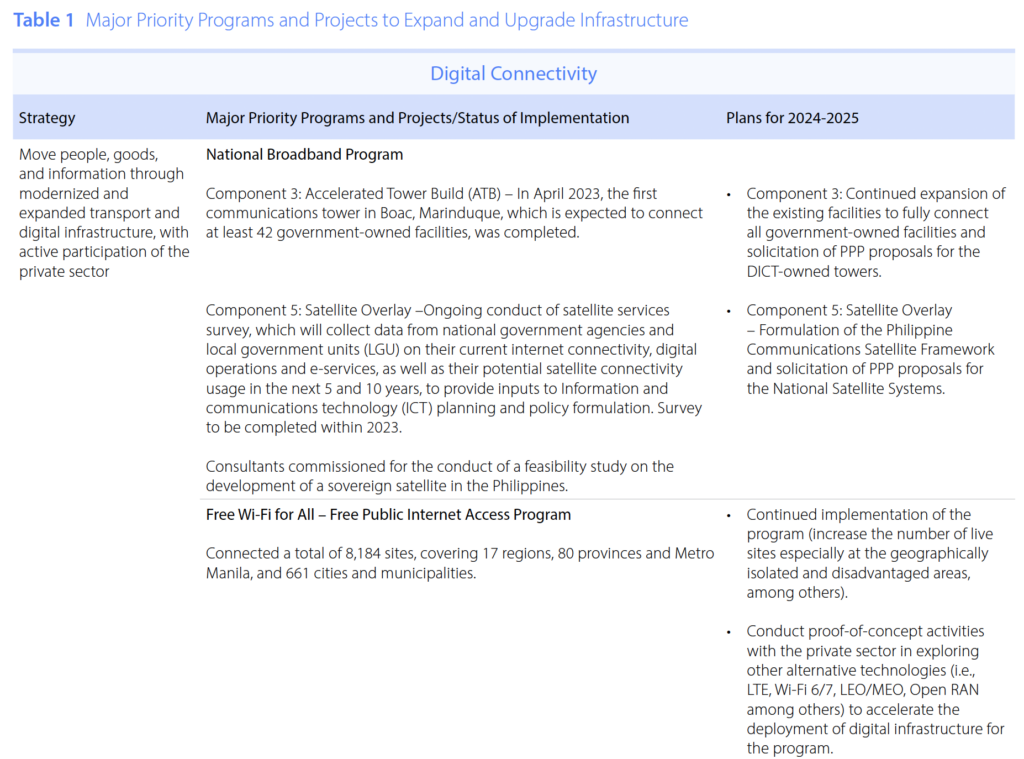The Philippine government is demonstrating heightened interest in partnership with private sector contributions to the country’s overall digital infrastructure development. In previous years, the target funding source for the country’s national government flagship ICT infrastructure projects, such as the National Broadband Program (NBP) and National Government Data Center (NGDC), has consisted of the annual national government budget appropriation. However, the release of the Philippine Development Report 2023 was an early signal of the government’s enhanced willingness to adopt PPP) models for information and communications technology (ICT) infrastructure funding.
The Philippine Development Report 2023 indicates that two of the Department of Information and Communications Technology (DICT) flagship programs are moving beyond conventional funding sources. For example, the NBP is planning to issue a call for PPP proposals for DICT-owned towers and National Satellite Systems. Further, the Free Public Internet Access Program (FPIAP) is going to engage the private sector in proof-of-concept initiatives aimed at discovering alternative technologies to boost digital infrastructure rollout.

The United States Agency for International Development’s (USAID) has used the Better Access and Connectivity (BEACON) project in the Philippines to actively support Philippine ICT infrastructure development through PPPs via a series of initiatives. In 2022, BEACON awarded a grant to the Research, Education, and Institutional Development (REID) Foundation to conduct training workshops for DICT personnel on PPP concepts and processes. Subsequently, a Memorandum of Agreement (MOA) was signed between DICT and the PPP Center on June 14, 2023, formalizing a collaboration for sustaining project assistance and promoting policy development. To address specific infrastructure needs, four project concept notes were developed. These included both the NBP Accelerated Tower Building Project and an Underground Fiber Optic Cable Conduit Network along the Philippine National Railroad’s 700-km right of way.
To support infrastructure planning, BEACON facilitated the conduct of a recent satellite demand study for the Philippines by the Asian Development Bank (ADB). The study projected significant future bandwidth requirements using two plausible growth rates. The lower 25% annual growth rate implies that total satellite demand could reach 2.3 terabits per second (Tbps) in 10 years. The higher 45% growth rate could push demand to 10.1 Tbps. Ultimately, adding this growth on top of existing demand implies that ultimate consumer demand could reach 4.8 Tbps to 19.1 Tbps, respectively. In addition, BEACON provided training that enabled DICT personnel to map all 235 DICT-owned towers, achieving 88% geospatial data coverage for 133 out of 151 tower lots. Furthermore, BEACON is facilitating access of DICT for transactional advisory services of ADB and Project Development and Monitoring Fund (PDMF) of the PPP Center for their priority PPP projects.
This article is an excerpt from the NRI 2024 main chapter, Building a Digital Tomorrow: Public-Private Partnerships for Digital Readiness.